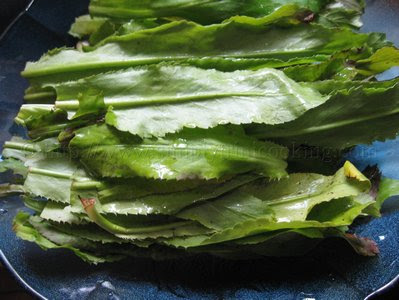In Trinidad and Tobago, the chadon beni (chado beni) or culantro is a treasured herb that is used in almost all local dishes, soups noodle dishes, curries, and seasoning all types of meat. Trinis just love it’s distinct pungent flavor. One of the most popular dishes that comprises mostly of chadon beni is the chadon beni sauce, that is especially used to flavor the most popular sandwiches in Trinidad and Tobago, the bake and shark.
Chadon Beni
Chadon beni can be sometimes mistaken for a weed. It has tall, stiff, serrated leaves that grow to the length of 4 to 8 inches long in a rosette format. At its central ridge it has a tall stalk, usually about 16-inches that has smaller prickly leaves and a cone-shaped greenish flower that carry the seeds.
Chadon Beni Many Names
There are many names the chadon beni goes by. The list is long, some are Arab parsley, saw leaf, sawtooth coriander, spiny coriander, bandhania, fitweed, sea holly (British), gad (Hebrew), alcapate (El Salvador), wanzendill (German), cilantro extranjero ( Mexico); pa pao or pak pai (Thai). ngo gai (Vietnam). It’s scientific name is Eryngium Foetidum.
A Trini Culinary Preference
This aromatic edible plant gives local dishes a wonderful aroma. It is also popular throughout the Caribbean, India, and Latin America. But chadon beni is not cilantro, though the two are related and have similar taste so they can be interchanged in menus. Generally, cilantro is referred to the herb’s leaves, while coriander is referred to the seed of the same plant.

This herb is best used fresh when flavoring food. Leaves should be bright green. However, it is used to make the local green seasoning mixture. It is blended with other herbs such as chive and thyme to make the popular green seasoning that is used to marinate meat.
Cultivating the Chadon Beni Plant
The chadon beni is a perennial plant that is grown in small patches. It grows best in hot and humid climates, but it is slow to germinate. It is also best to transplant the chadon beni plant in soil that is moist and well-drained. The plant should not be get too much direct sun-light. It is easier to handle this herb when the stalks are removed.
Nutritional and Health Benefits
Chadon beni has nutritional and health benefits. It is a stimulant for appetite and helps aid in digestion. It is also used to treat flu, pneumonia, diarrhea, fever, cough, vomiting and convulsion. it has a high content of calcium, beta-carotene, riboflavin, and iron.
Now you can certainly see the value of this wild Trini Herb. For this reason, the chadon beni herb is certainly one of the Caribbean secret ingredients that is hidden right in our backyard.
Download our free toolbar
Join our Facebook fanpage
Subscribe to our Newsletter
You will also like:
The Vegetable Garden
Oysters: A Trini Street Food
Aloe Vera: The “Elixir of Longevity”

I planted Shado Beni this summer (Canada) if I leave it in the ground during winter will it grow back next summer?
Put it in a pot and keep it inside.